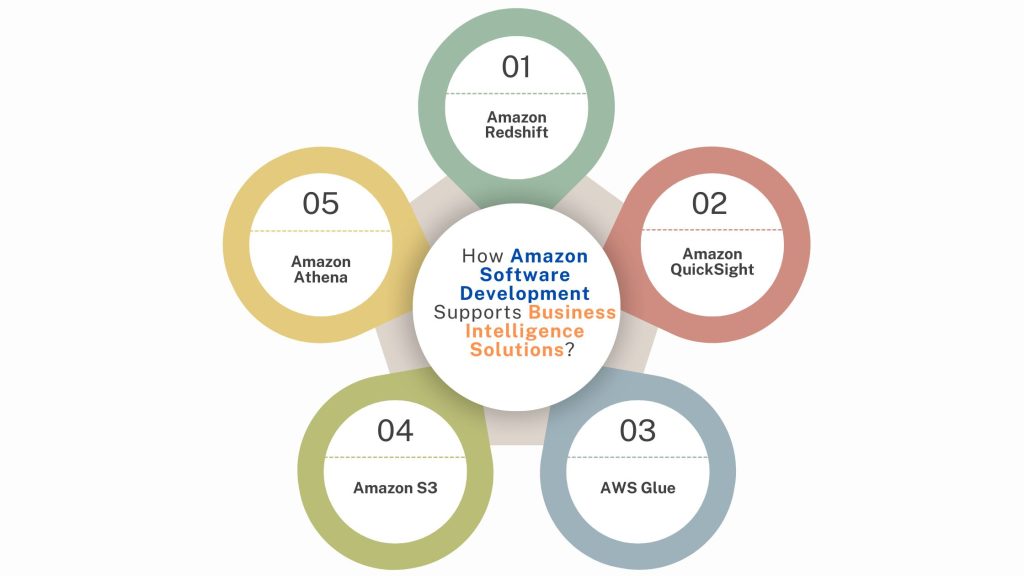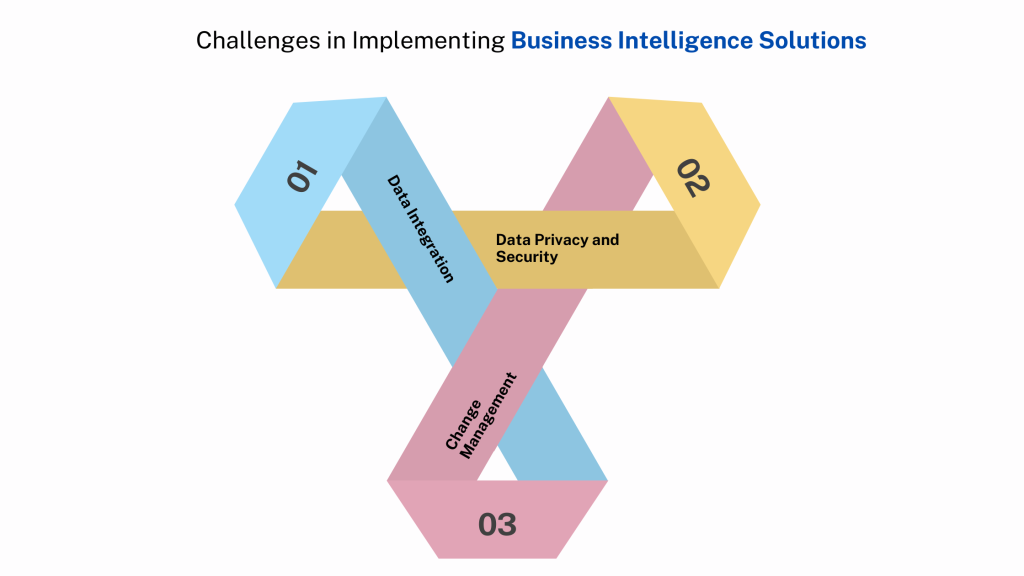Did you know that telecom businesses deal with huge amounts of data regularly? Be it the interaction of the customer or the performance of the network, telecom businesses have much to deal with. However, handling a massive flow of information can be difficult considering the scenario. Therefore, business intelligence solutions play a crucial role, enabling telecom companies to make proper decisions.
Telecom operators are facing the growing demand for better customer experience as well as streamlined operations. Thus, they need strong solutions that enable them to understand the behavior of customers, based on trends, and come up with relevant services. For the telecom industry, Amazon software development, through cloud-based solutions, is transforming how people interact with BI. Solutions.
Telecom companies can make decisions faster and optimize processes while offering customized services to their customers using Amazon’s BI tools. This ultimately results in better customer satisfaction, lower operational costs, and newer growth opportunities.
What is Business Intelligence?
Business Intelligence is the technologies and strategies by which an organization accesses data sources, transforms data into different forms, and analyzes it. It subsequently uses the results to convert that information into actionable insight. BI solutions in the telecom sector help companies understand the behavior of customers, optimize operations through various means, and help increase revenue.
Business Intelligence is very important for telecom business because of an umpteen number of reasons:
Data-Driven Decision Making
The BI solution works wonders for telecom companies. This is because business intelligence services help them make suitable decisions. Additionally, they ensure better outcomes with time.
Improved Customer Experience
The perceived behavior of customers makes telecommunication companies change their delivery of service, and hence the level of quality increases among customers.
Operational Efficiency
BI tools enable companies to identify the inefficiencies in operations, and process improvement takes place to increase revenue.
Revenue growth
With insights founded on trends and customers, streams of revenue are gained and innovations of new products occur.
Why Is Business Intelligence Important for Telecom?
Most of the telecom companies are facing challenges that are difficult to resolve. Below are some of them here:
Increased Competition
With more and more companies introduced in the market, telecom companies are facing stiff competition. Not every company is the same. While some of them offer the best experience to customers, others do have competitive prices.
Huge amount of data
As more and more people are utilizing IoT, mobile devices, or high-speed Internet, the quantities of data have skyrocketed. Thus, there is an absolute need for companies to own premium tools that would help process, store, and analyze huge volumes of data in the most effective way possible.
Complex Infrastructure
After recent advancements in 5G, data-driven information will ensure resource allocation and optimum networking to be successful.
Demanding customer behavior
Customers have never been so demanding. What the telecom is expected to do here is look ahead into the future needs of customers and offer experiences to retain and attract users.
All the above challenges can be resolved through business intelligence. This will allow the telecom operators to outshine others in all phases by making use of BI tools.
How Amazon Software Development Supports Business Intelligence Solutions?

Telecom organizations can use cloud computing services to meet their BI needs. The key services of AWS enhance business intelligence through the following aspects:
Amazon Redshift
Amazon Redshift is a fully managed service in cloud computing. It has made telecom companies store huge amounts of data and can find it instantly. They can use Redshift to run complex queries or generate reports in real-time. Thus, the time taken in decision-making decreases.
Amazon QuickSight
Amazon QuickSight is an enterprise analytics service. Through this, a user can visualize and share insights. The companies can produce dashboards or reports that are interactive in assisting the stakeholders in understanding what goes on with the trends of data. QuickSight allows users to obtain access to various sources of data. As an outcome, they can generate comprehensive reports.
AWS Glue
AWS Glue is a fully managed service making it easier to prepare and load data for analytics. This makes it easy for telecom companies to automatically draft and process their data preparation processes by enlisting the services of the former for them to focus on deriving the insights rather than managing the data.
Amazon S3
Amazon Simple Storage Service (S3) can prove to be very scalable and storage, whereby data from huge amounts is stored in a telecom company in a very safe manner. This again proves that such data can be handled by businesses while integrating it with other services in AWS for use in analysis.
Amazon Athena
Amazon Athena is an interactive query service from Amazon. It helps users to analyze data in S3 using SQL. Telecom companies can run queries against big data without having to set up intricate infrastructure, which makes it easier for them to draw insights from their data.
Using Amazon Software Development for Custom BI Solutions
In addition to AWS services, Amazon software development company helps telecom companies design self-sustained BI solutions that exactly fit the needs of their organizations. Here is why:
Integration with Existing Systems
Most of the telecommunication companies usually have legacy systems. Amazon software app development can ensure that legacy systems are integrated with the new BI solutions, maximizing investment value and at the same time reducing switchover costs.
Custom Dashboards and Reports
Each telecom company has specific requirements related to data analytics. Companies can use the software development capability of Amazon to develop customized dashboards and reports that support their business needs. This flexibility allows a company to focus on those metrics that are most important to its operations.
Scalability and Flexibility
Telecom business requirements grow with the need for more data. It would be possible to develop solutions that scale from Amazon software development to accommodate growing volumes of data as well as shifting business requirements. This scalability allows continuous derivation of insight as their business keeps growing.
Real-World Applications of Business Intelligence in Telecom
Here is how these solutions are transforming the telecom industry:
Improving Customer Retention
Telecom companies experience a lot of customer churn. A BI solution, developed using Amazon software application development can be used to analyze data relating to customers. By incorporating BI solutions into telecom companies, patterns or trends in the data captured will emerge. Businesses can provide retention strategies; for instance, firms can provide offers to their specific customers and loyalty programs. This will allow them to understand why their customers leave.
Optimizing Network Performance
Network performance is considered a prime issue by telecom companies. They use BI tools, where businesses can get real-time monitoring of the network and observe inefficiency points. With AWS services, telecom companies will gather and analyze data from all devices within the network that helps optimize performance and minimize downtime.
Enhancing Marketing Strategies
The telecom sector can implement BI solutions to understand what their customers do and prefer. Once a telecom firm knows exactly what its customers want, it can subsequently tailor its marketing strategies and offers. For instance, a telecom operator can initiate targeted campaigns against defined customer segments based on the insights gleaned from data analysis.
Streamlining Operations
Telecom companies must also operate efficiently to compete. BI solutions help trace bottlenecks in the operations and advise on how to reduce them. For instance, common issues can be found by analysis of data on service requests, and this enables proactive maintenance.
Challenges in Implementing Business Intelligence Solutions

Telecom companies can gain significant benefits through BI solutions. However, the deployment of the tools themselves might be a challenge to them.
Data Integration
The major data is stored in different systems and forms by telecom companies. This implies that integrating the data will be a daunting task. For instance, preparing the data to analyze can be simplified through services like AWS Glue.
Data Privacy and Security
With data privacy and protection becoming an imperative requirement these days, telecom companies need to make sure that their BI solution adheres to the norms defined by GDPR and other regulating bodies. AWS provides robust security features through which businesses can now safeguard their data. However, vigilance in the form of proper data handling practice has to be maintained by the firms.
Change Management
There may also be some cultural changes needed because the organization would be taking on new BI solutions. Since the employees would have to adapt to some new sets of tools and processes, training can reduce friction when adopting these new technologies. To achieve this, telecom companies should invest in change management practices for a successful changeover.
The Future of Business Intelligence in Telecom
Technological progress appears promising for the business intelligence sector in telecommunication further. Here are a few trends to watch out for:
Artificial Intelligence and Machine Learning
Artificial intelligence and machine learning will be a part of BI. These technologies will enable telecom companies to get more latent insights from data and automate decision-making processes.
Real-Time Analytics
With the increasing real-time insights, the demand for BI solutions will increase. This is because telecom companies rely on solutions that can provide real-time analytics capabilities. This is a feature well-suited for the support of AWS services- where companies can analyze data as it comes in.
Enhanced Personalized Experience to Clients
Telecom companies will achieve more personalized experiences for their clients through the use of BI solutions. Businesses can tailor their offerings according to the data of the customers and thereby increase customer satisfaction by analyzing them.
IoT Data Integration
With the introduction of IoT, telecom companies would need to analyze data from IoT devices. This necessitates robust BI solutions that can handle heterogeneous sources of data.
5G Analytics
As 5G rolls out, telecom operators will require intelligent BI applications for high-speed network data volume analysis and performance optimization.
Predictive Maintenance
Telecom firms will use predictive analytics to predict equipment failures and network malfunctions. This as a result will cut down on downtime, provide higher reliability, and improve service quality.
Better Data Visualization
More advanced tools for visualization will come into play to make sense of complex data and present it in very interactive dashboards.
Cost Optimization
BI shall help optimize cost by analyzing operational data. It ensures proper and efficient resource utilization.
Security and Privacy
Data security shall become a major issue, and BI tools shall thus help telecoms monitor the sensitive information of customers, thereby protecting their sensitive information.
Conclusion
In a nutshell, Amazon software development leads the revolution in the telecom sector with astounding Business Intelligence services. Companies in the telecom sector can tap into the power of data to make better-informed decisions, take an elevated experience for customers, and improve their functioning using tools such as Amazon Redshift, QuickSight, and AWS Glue. To harness these powerful tools effectively, many organizations choose to hire software developers skilled in Amazon’s BI ecosystem to optimize their data strategies and drive results.
In this regard, the benefits of business intelligence solutions outweigh the hurdles. The future of business intelligence, therefore, seems bright and promising going forward in the telecom industry, considering that technology is a phenomenon that cannot be foreclosed.
Telecoms would easily present themselves as the pioneers of change as they stay abreast with their customers’ needs by embracing the development capabilities of Amazon’s software.
Are you a telecom business wanting to succeed with top BI solutions? At SoftProdigy, we specialize in leveraging Amazon’s advanced tools to help you stay ahead and enhance your operations. That said, contact us to learn more.
FAQs
How does Amazon software development help in business intelligence in the telecom sector?
Amazon provides high-end cloud-based solutions through AWS (Amazon Web Services), storing, analyzing, and processing data for companies in the telecom sector. All such interventions further contribute to delivering optimal network performance, enhancing customer experience, and making decisions based on insights provided through deep capabilities via AI and machine learning.
Which Amazon tools support telecom business intelligence?
Critical tools of Amazon are its AWS Glue, which helps integrate data, Amazon Redshift for data warehousing, and Amazon QuickSight for visual analytics. These support business intelligence of the telecom sector and make the telecommunication sector process data and reports appropriately to derive actionable insights from huge data sets.
How does the development at Amazon on software help in customer experience in the telecom industry?
Amazon’s software tools, primarily AI and ML-based applications, enable telecom companies to predict the behavior of their customers, enhance the delivery of service, and tailor offerings. This is to make sure that the customer is more satisfied with the delivery of service, issues resolved faster, optimized network performance, and recommendations.











